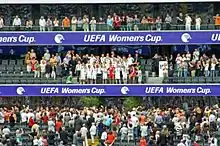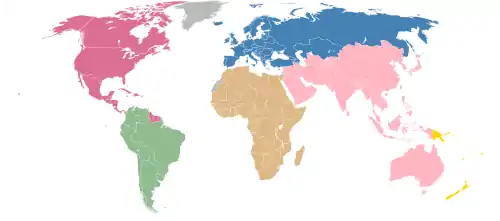UEFA Women's Champions League
The UEFA Women's Champions League, previously called the UEFA Women's Cup (2001–09), is an international women's association football competition. It involves the top club teams from countries affiliated with the European governing body UEFA.
 | |
| Founded | 2001 |
|---|---|
| Region | Europe (UEFA) |
| Number of teams | 41 |
| Current champions | |
| Most successful club(s) | |
| Website | Official website |
The competition was first played in 2001–02 under the name UEFA Women's Cup, and renamed the Champions League for the 2009–10 edition. The most significant changes in 2009 were the inclusion of runners-up from the top eight ranked nations, a one-off final as opposed to the two-legged finals in previous years, and – until 2018 – playing the final in the same city as the men's UEFA Champions League final. From the 2021–22 season, the competition proper will include a group stage for the first time in the Women's Champions League era.
Lyon is the most successful club in the competition's history, winning the title seven times, including the last five tournaments.
Format
UEFA Women's Cup (2001–2009)
A preliminary round was played to reduce teams to 32, in the first season only two teams played a two-legged match, the following seasons were played as four team mini-tournaments which had the winner advance to the group stage. Teams were then divided into eight groups of four. The groups were played again as mini-tournaments at a single location over the course of five days. The group winners then advanced to the quarter-finals. The knock-out rounds were played as two-legged. That included the final which was only played as a single leg in 2002.
For the 2004–05 season the group stage was played in four groups with the top two teams advancing to the quarter-finals. That resulted in more qualifying groups.
Champions League (2009–2021)
On 11 December 2008, UEFA announced that the competition would be reformatted and renamed to the UEFA Women's Champions League.[1] As in the men's game, the new tournament aims to include runners-up of the top women's football leagues in Europe,[2] and the title holder has the right to enter if they do not qualify through their domestic competition. Also similar to the men, the final is to be played in a single match.
The competition is open to the champions of all 55 UEFA associations. However, not all associations have or had a qualifying women's league, and not all nations opt to participate each year. Due to the varying participation, the number of teams playing the qualifying round and teams entering in the round of 32 change from year to year. The principles are inferred from the access list:[3] Numbers are based on three principles:
- Groups of 4 teams shall contest the qualifying rounds.
- The group winners shall qualify for the main round.
- The smallest possible number of qualifying group runners-up shall qualify for the main round.
For example, in a 53-team tournament, 25 teams directly enter the R32, with seven qualifying groups providing seven group winners and no runners-up; if the tournament were 60 teams instead, 20 teams would directly enter the R32, with ten qualifying groups providing ten group winners and two runners-up.
Minor adjustments
When the new format was initially announced, the eight top countries according to the UEFA league coefficient between 2003 and 2004 and 2007–08 would be awarded two places in the new Women's Champions League.[2] The runners-up from each country participated in the qualifying rounds for the first two years under the Champions League format.
For the 2011–12 tournament, the runners-up from the top eight nations instead qualified directly to the R32. For the five years under this format, seven nations remained in the top eight: Germany, Sweden, England (both iterations), France, Denmark, Russia, and Italy. A different nation provided the eighth runner-up in each of the five years: Iceland, Norway, Austria, Czech Republic,[4] and Spain[5] in that order.
The tournament was expanded again for the 2016–17 season, with the runners-up from nations 9–12 in the UEFA league coefficient also qualifying. Whether they begin participation in the qualifying round or the R32 depends on how many total teams participate in the tournament. For the first three years under this format, the four nations in these slots were Czech Republic, Austria, Scotland, and Norway, though Czech Republic rose into the top 8 at the expense of Russia; for the 2019–20 season, Switzerland replaced Norway, and for the final season under this format, Norway, Kazakhstan, and The Netherlands replaced Russia, Scotland, and Austria in the top 12.
Champions League (2021–)
On 4 December 2019, the UEFA Executive Committee approved a new format for the 2021–22 season.[6] The top six associations will enter three teams, the associations ranked 7–16 will enter two, and the remaining associations will enter one. The competition is restructured to appear much more similar to the men's CL format than before, with a double-round-robin group stage in the competition proper, the first time in the Women's Champions League era, and two paths (a champions path and a non-champions path) for all teams that do not automatically qualify for the group stage. UEFA will also centralise the media rights from the group stage onward, having previously only done so for the final.[7]
Under this new format, the group stage - four groups of four - qualifies eight teams to the home-and-away quarterfinals, at which point the competition remains the same as before. Four teams qualify directly to the group stage: the defending UWCL champions and the league champions from the nations ranked 1–3 by UEFA coefficient. Seven teams qualify from the champions path - guaranteeing that at least ten nations will be represented in the group stage - and five from the league path. Qualification along both paths takes place in two rounds: a first round consisting of four-team, predetermined-venue miniature tournaments (one-off semifinals, third place, and final matches) and a second round of paired home-and-away ties. In this format, the first round is similar to the previous qualifying round except that teams play a two-game knockout tournament instead of a three-game round-robin, and the second round is similar to the previous round of 32 except that the range of possible opponents is more stratified.
| Teams entering in this round | Teams advancing from the previous round | ||
|---|---|---|---|
| First round August |
Champions Path (44 teams) |
| |
| League Path (16 teams) |
| ||
| Second round Aug/Sept |
Champions Path (14 teams) |
|
|
| League Path (10 teams) |
|
| |
| Group stage (16 teams) Oct/Nov/Dec |
|
| |
| Knockout phase (8 teams) Mar/Apr/May |
| ||
Prize money
Prize-money was awarded for a first time in 2010 when both finalists received money. In 2011 the payments were extended to losing semi- and quarter-finalists.[8] The current prize-money structure is
- €250,000 winning team
- €200,000 losing finalist
- €50,000 losing semi-finalists
- €25,000 losing quarter-finalists
In the Champions League teams also receive 20,000 Euro for playing each round or the qualifying. There have been several complaints about the sum, which doesn't cover costs for some longer trips which include flights.[9]
Sponsorship
Until the 2015–18 cycle, UEFA Women's Champions League used to have the same sponsors as the UEFA Champions League. However, starting from the 2018–21 cycle, women's football competitions – including the Champions League – have their separate sponsors.[10]
| Official Sponsors |
|---|
Records and statistics
Winners
| Club | Winners | Runners-up | Years won | Years runners-up |
|---|---|---|---|---|
| 7 | 2 | 2011, 2012, 2016, 2017, 2018, 2019, 2020 | 2010, 2013 | |
| 4 | 2 | 2002, 2006, 2008, 2015 | 2004, 2012 | |
| 2 | 3 | 2003, 2004 | 2002, 2007, 2008 | |
| 2 | 3 | 2013, 2014 | 2016, 2018, 2020 | |
| 2 | 2 | 2005, 2010 | 2006, 2011 | |
| 1 | 0 | 2007 | ||
| 1 | 0 | 2009 | ||
| 0 | 2 | 2015, 2017 | ||
| 0 | 1 | 2003 | ||
| 0 | 1 | 2005 | ||
| 0 | 1 | 2009 | ||
| 0 | 1 | 2014 | ||
| 0 | 1 | 2019 |
By nation
| Nation | Winners | Runners-up | Semi-finalists | Winner | Runners-up | Semi-finalists |
|---|---|---|---|---|---|---|
| 9 | 7 | 8 |
|
|
| |
| 7 | 4 | 7 |
|
|
| |
| 2 | 5 | 4 |
|
|
| |
| 1 | 0 | 10 |
|
| ||
| 0 | 1 | 3 |
|
| ||
| 0 | 1 | 2 |
|
| ||
| 0 | 1 | 0 |
|
|||
| 0 | 0 | 2 |
| |||
| 0 | 0 | 1 |
| |||
| 0 | 0 | 1 |
|
Since the format change in 2009, no team from a nation outside the top two has made the final, save for Tyresö in 2014 and Barcelona in 2019. Also, no team from a nation outside the top four made the semi-finals until Brøndby in 2015. Barcelona has since made the semi-finals in 2017, 2019 and 2020.
Top scorers by tournament
The top-scorer award is given to the player who scores the most goals in the entire competition, thus it includes the qualifying rounds. Iceland's Margrét Lára Vidarsdóttir has won the award three times. Ada Hegerberg holds the record for most goals in a season.
| Season | Top scorer(s) (Club) | Goals |
|---|---|---|
| 2019–20 | Vivianne Miedema (Arsenal) Emueje Ogbiagbevha (Minsk) Berglind Björg Þorvaldsdóttir (Breiðablik) | 10 |
| 2018–19 | Pernille Harder (VfL Wolfsburg) | 8 |
| 2017–18 | Ada Hegerberg (Olympique Lyonnais) | 15 |
| 2016–17 | Zsanett Jakabfi (VfL Wolfsburg) Vivianne Miedema (FC Bayern Munich) | 8 |
| 2015–16 | Ada Hegerberg (Olympique Lyonnais) | 13 |
| 2014–15 | Célia Šašić (Frankfurt) | 14 |
| 2013–14 | Milena Nikolić (ŽFK Spartak) | 11 |
| 2012–13 | Laura Rus (Apollon Limassol) | 11 |
| 2011–12 | Camille Abily (Olympique Lyonnais) Eugénie Le Sommer (Olympique Lyonnais) | 9 |
| 2010–11 | Inka Grings (FCR 2001 Duisburg) | 13 |
| 2009–10 | Vanessa Bürki (FC Bayern München) | 11 |
| 2008–09 | Margrét Lára Viðarsdóttir (Valur Reykjavík) | 14 |
| 2007–08 | Vira Dyatel (Zhilstroy-1 Karkhiv) Patrizia Panico (ASD CF Bardolino Verona) Margrét Lára Viðarsdóttir (Valur Reykjavík) | 9 |
| 2006–07 | Julie Fleeting (Arsenal LFC) | 9 |
| 2005–06 | Margrét Lára Viðarsdóttir (Valur Reykjavík) | 11 |
| 2004–05 | Conny Pohlers (1. FFC Turbine Potsdam) | 14 |
| 2003–04 | Maria Gstöttner (SV Neulengbach) | 11 |
| 2002–03 | Hanna Ljungberg (Umeå IK) | 10 |
| 2001–02 | Gabriela Enache (FC Codru Anenii Noi) | 12 |
All-time top scorers
- As of 30 August 2020[16] Bold players still active.
International broadcasters
This article should not be confused with List of UEFA Champions League broadcasters
2018–19 until 2020–21
Final only.[17][18] The coverage will be live streamed on UEFA YouTube channel in the unsold markets with highlights available in all territories.
Europe
^AUT ^IRL ^TUR – exclude 2019 Final.
^FRA – 2019 on TMC, 2020 on W9, and 2021 on TBA. Broadcasting rights for FTA broadcasters may change at any time, depending on the decision of Canal+ as the main broadcasting rights holder.
^NRD – FTA coverage only available in Norway and Sweden.
^UK – coverage of Glasgow City F.C. on BBC Alba and Chelsea F.C. Women on the 5th Stand app and on the Chelsea FC website.
Outside Europe
| Country/Region | Broadcaster | |
|---|---|---|
| Free | Pay | |
| Sports Flick | ||
| DAZN | ||
| PPTV | ||
| ESPN | ||
| Sky Sport | ||
| beIN SportsNZL | ||
| E.tv | ||
| ViacomCBS[24]USA | ||
^NZL ^RSA – exclude 2019 Final.
^USA – B/R Live only aired the 2019 Final. After then, the 2020 and 2021 final matches coverage had moved to CBS after B/R resigned.
Gallery
 2005 champions
2005 champions 2008 final
2008 final 2008 final score
2008 final score 2008 champions
2008 champions 2012 final
2012 final
See also
References
- "Women's Champions League launches in 2009". 11 December 2008. Retrieved 8 May 2009.
- "Women's Champions League details confirmed" (PDF). Retrieved 8 May 2009.
- "Access list for the 2014/15 season" (PDF). UEFA. Retrieved 5 June 2014.
- "UEFA Women's Champions League association coefficient rankings: places for the 2013/14 season" (PDF). UEFA. Retrieved 7 August 2015.
- "Access List for the UEFA Women's Champions League 2015/16" (PDF). UEFA. Retrieved 7 August 2015.
- "Game changer: group stage for UEFA Women's Champions League". UEFA.com. Union of European Football Associations. 4 December 2019. Retrieved 4 December 2019.
- "New Women's Champions League format with group stage: how it will work". UEFA.com. Union of European Football Associations. 4 December 2019. Retrieved 4 December 2019.
- "UEFA Women's Champions League factsheet" (PDF). UEFA. Retrieved 21 January 2013.
- "British teams competing in Women's Champions League receive 'farcical' funding from Uefa". The Daily Telegraph. 6 October 2013. Retrieved 9 October 2013.
- "UEFA unbundles sponsorship rights for women's competitions", UEFA, 15 November 2017
- "Visa signs ground-breaking seven-year women's football deal with UEFA", UEFA, 6 December 2018
- "Nike on the ball with exclusive UEFA Women's Football deal", UEFA, 11 March 2019
- UEFA.com (23 February 2020). "Hublot becomes official partner of UEFA Women's EURO 2021 | Inside UEFA". UEFA.com. Retrieved 24 February 2020.
- UEFA.com (10 October 2019). "Esprit signs up to become UEFA Women's Football Partner | Inside UEFA". UEFA.com. Retrieved 26 October 2019.
- UEFA.com (26 August 2020). "PepsiCo signs 5-year deal to sponsor UEFA Women's football | Inside UEFA". UEFA.com. Retrieved 27 August 2020.
- Hegerberg becomes all-time top scorer
- "Where to watch the UEFA Women's Champions League final". UEFA. Retrieved 15 May 2019.
- "Where to watch the UEFA Women's Champions League final". UEFA. 29 August 2020. Retrieved 29 August 2020.
- "Champions League: Viertelfinal-Prüfung für Österreicherinnen". ORF (in German). 22 August 2020. Retrieved 25 August 2020.
- "La finale de la Ligue des champions femmes sur W9 et Canal + - Foot - C1 (F)". L'Équipe (in French). Retrieved 26 August 2020.
- "Ten-player Lyon battle into another Champions Lge final". RTÉ. 26 August 2020.
- "Lyon v Barcelona: FREE live stream and how to watch on BT Sport". BT Sport. Retrieved 17 May 2019.
- Gol (17 May 2019). "#LyonBarçaEnGol ¿Aparecerá la magia de @liekemartens1 en Budapest? La holandesa ya ha anotado dos goles en la actual @UWCL Mañana 18:00 @OLfeminin #GOL". Twitter (in Spanish). Retrieved 17 May 2019.
- Tannenwald, Jonathan. "CBS All Access to broadcast UEFA Women's Champions League tournament". Inquirer. Retrieved 20 August 2020.
External links
| Wikimedia Commons has media related to UEFA Women's Champions League. |
